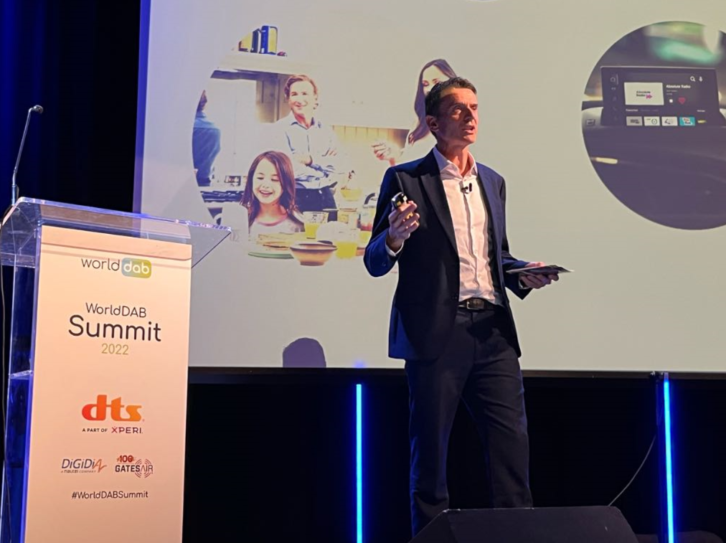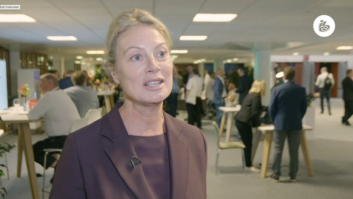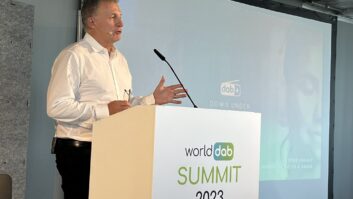When it comes to listenership and market share, UK live radio is experiencing a “sonic boom” of success; however, the UK government needs to step in to ensure the industry’s future survival in an increasingly online/smart speaker world.
That was the gist of Radiocentre CEO Matt Payton’s talk, entitled “Powering the Sonic Boom,” at the WorldDAB Summit 2022 on Nov. 17 in London. Radiocentre is a UK commercial radio industry association. WorldDAB is the global industry forum for DAB digital radio.
Profiting From Change
Payton started his talk by noting how much the UK audio market has changed in the last few years due to the adoption of smart speakers, “connected cars” with access to internet audio, and the availability of new audio content through DAB stations and podcasting.
“These changes in technology have undoubtedly worked in radio’s favor so far, making it even more accessible and available to audiences however and wherever they’re listening,” he said. “So it should come as no surprise that radio also represents the biggest share of listening to all commercial audio (in the UK) overall. Live radio’s listening share of the commercial audio market is an incredible 80% or so.”

Better yet, the size of the UK commercial audio market overall is increasing, said Payton. “That’s really encouraging as it demonstrates that radio can work alongside podcasts and on-demand audio, expanding choice for audiences and advertisers. And it shows it doesn’t need to be a zero-sum game between live radio on the one hand and on-demand audio on the other hand. Both can grow and they can thrive together.”
UK commercial radio’s investments in innovative audio services over the years has led to this success, said Payton. Thanks to these investments, “the total reach of commercial radio in the UK has grown 15% over the last 10 years and now reaches a record 38 million people each week.”
“There’s no doubt the expansion of choice and the growing popularity of digital services has been a major factor in this,” said Payton. “If you look at the total hours spent listening to commercial radio over that period, you can see that’s also grown 17% in the last 10 years.”
[Sign Up for Radio World’s SmartBrief Newsletter]
Action Needed to Ensure Radio’s Future
Having delivered this bounty of good news, Payton did warn that the future success of commercial radio in the UK in an increasingly online world is not a sure thing. To keep the industry strong going forward, “we need changes to the regulation and the legal framework if radio is gonna continue to thrive,” he said. “Specifically, we believe radio and audiences in the UK would be better served by changes in two main areas. Firstly, we think there should be regulation around BBC Radio services. Secondly, we need to ensure that all radio remains freely accessible and available to everyone, especially online.”
When it comes to the BBC’s radio services, Payton’s comments implied that the public broadcaster’s content should not be replicating what is being provided on UK commercial radio. “Just very briefly on the BBC: We know it plays a very important and valuable role in the radio and audio market and we generally have really good positive relationships and partnerships with the BBC,” he said. “But it is by far the biggest single operator in UK radio and this role comes with responsibility to provide truly distinctive services, and we believe more could and should be done in that area. And it’s really important we get that right.”
On the second issue of keeping radio free and easily accessible to listeners, Payton said that UK commercial radio stations have “a lot of issues in common with the BBC where we can be working together; for example, on the access/findability of radio. This has become a really pressing issue for all of us, especially as online listening of radio becomes greater and more established on smart speakers — now accounting for an incredible 73% of audio listening on these devices in the UK.”
Right now most UK radio is heard over the air, he noted, “and that’s likely to continue mainly on FM and DAB. But consumer habits are changing and we can’t ignore that. In the past four years, online listening in the UK to live radios more than doubled and now represents 24% of listening time with smart speakers, accounting for the majority of listening on connected devices.”
On the positive side, the growth of listening via smart speakers creates “some fantastic opportunities for all of us, particularly commercial players,” he said. But “the gatekeeper role played by Amazon, Google, and the other platforms puts them in an incredibly powerful and potentially dominant position right between radio and its audiences. That dominance creates real risks for the future, especially if there’s no ground rules on how radio content is offered, accessed and commercialized.”
This is where Payton said the UK government should step in to ensure that online “gatekeepers” don’t use their positions to steer listeners to their own audio content and away from what’s being offered online by UK radio stations. “As a result, we think it’s vital that the government brings forward measures to secure radio’s position online,” he concluded. “[That’s] something we think actually can be done pretty simply and effectively in a way that’s ultimately a win-win for radio for audiences and the platforms themselves. “












